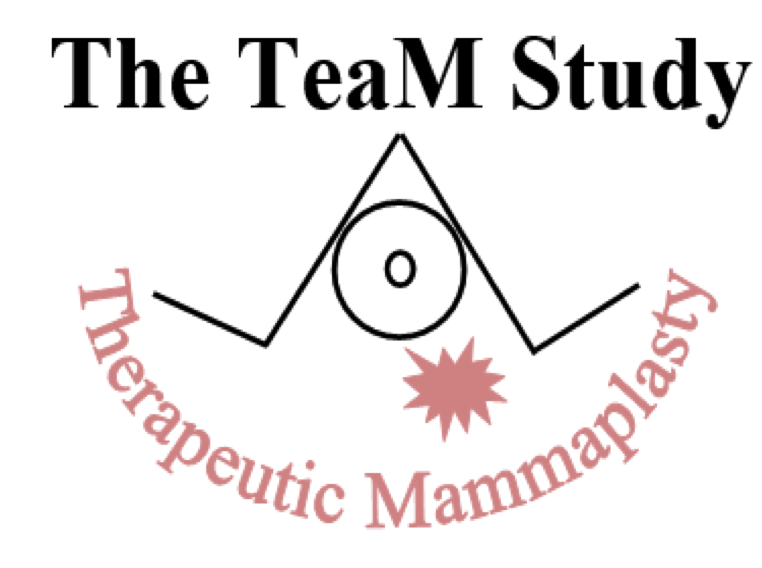TeaM
TeaM results accepted for publication
The TeaM results paper has been published in the British Journal of Surgery.26-08-2018
UPDATE: 19/07/2017
Recruitment closed on 30th June 2017. Final data entry is underway. There are currently 729 records in the system. Well done to everyone involved!
Certificates will be issue to collaborators once the final data have been verified during autumn 2017.
UPDATE: 21/11/2016
Elizabeth Baker presented an update at the iBRA3 Study Day.
46 centres are participating. To date 37 patients have been entered into REDCap.
Recruitment will continue to the end of February. Units can still join the study.
Background
Breast conserving surgery (BCS) and adjuvant radiotherapy is an established treatment for early breast cancer. While many women may prefer breast conservation to mastectomy, in many cases, standard BCS may result in unacceptable cosmetic outcomes which may adversely impact on patient satisfaction and quality of life. Therapeutic mammaplasty (TM) describes ‘the oncoplastic application of breast reduction and mastopexy techniques to treat selected breast cancers by breast conserving surgery (BCS)’. These techniques effectively extend the boundaries of traditional BCS by allowing adequate resection of larger tumours in women with medium to large breasts without compromising cosmetic outcome; provide an alternative to mastectomy +/- reconstruction in those with ptotic breasts and may improve outcomes for women with large breasts in whom standard BCS followed by radiotherapy may be associated with lymphoedoema, fibrosis and chronic pain.
Despite the widespread adoption of these techniques into routine practice, there is limited high-quality evidence to support benefits of this approach. TM procedures are more complex than standard BCS with significant associated resource implications and concerns have been raised regarding both complication rates and oncological safety when TM is performed. Although these concerns are not supported by the literature, the majority of published studies are small, retrospective single centre, often single surgeon case series with limited follow-up that are poorly designed and reported with inconsistent end-points that limit cross-study comparison such that the findings cannot be relied upon. Two recent systematic reviews have highlighted the paucity of high-quality clinical, oncological and cosmetic outcome data and emphasised the urgent need for well-designed prospective studies to establish the indications and outcomes of therapeutic mammaplasty to determine best practice. Uncertainties relating to the current indications for TM including the practice and outcomes of TM in large tumours (>4cm) not traditional managed by BCS; rates and management of margin positivity; predictors of adverse outcomes; the impact of TM on delivery of adjuvant therapy and appropriate assessment of key patient reported outcomes including, but not limited to, aesthetic end-points, as well as long term data on recurrence rates in particular need to be addressed if the procedure is to be offered and bench-marked appropriately.
Although RCTs provide the best evidence for the effectiveness of an intervention, trials are largely inappropriate in this context. A high-quality prospective multicentre cohort study exploring the practice and outcomes of these techniques is therefore essential to support the safe practice of TM, generate guidelines, guide decision-making and inform health policy.
Aims and objectives
i. To identify the number of units performing TM across the UK and the volumes of procedures performed
ii. To describe the current practice of therapeutic mammaplasty (TM) including the indications and techniques used
iii. To evaluate the clinical outcomes of TM using different techniques and explore predictors of adverse outcome.
iv. To determine the impact of TM on the delivery of adjuvant therapy
v. To determine best practice with regards to TM with a view to generating national guidelines
vi. To establish a network of units performing TM willing and able to participate in future research studies
vii. To inform the feasibility, design and conduct of a prospective multicentre cohort study exploring the clinical, patient-reported and oncological outcomes of TM.

